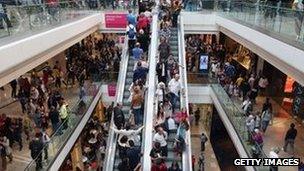UK inflation rate eases in August, ONS says
- Published

Prices in the shops are still rising, but at a slower rate than previously
The pace of price rises slowed in August compared with the previous month, official figures have shown.
The annual rate of inflation in the UK, as measured by the Consumer Prices Index (CPI), fell back to 2.5% in August from 2.6% in July, the Office of National Statistics said.
The fall was partly due to smaller rises in furniture and gas prices.
The Retail Prices Index (RPI) inflation measure, which includes housing costs, fell to 2.9% from 3.2% in July.
The ONS said there would be a consultation on possible improvements to the RPI from 8 October to 30 November.
Further falls?
The latest CPI figures show that prices were 2.5% higher in August than they were in the same month last year.
Apart from two monthly rises, the rate of inflation has been falling steadily since peaking at 5.2% in September last year.
The ONS said smaller rises in the price of clothing had also contributed to the fall in the rate of inflation - the price rises recorded in July had been the largest on record.
ONS statistician Richard Campbell: "Important to look at the general inflation trend"
This helped to offset bigger rises in the price of petrol and a rise in the cost of rail travel, which had fallen a year earlier.
Analysts had expected the CPI rate to fall following the rise to 2.6% in July, which was also down to rising air fares and an early end to sales due to the Olympics.
Looking ahead, the ONS said a number of factors could put upward pressure on prices.
"Some of the utility companies are talking about price increases in the next few months, [while] there have been reports of poor harvests in many parts or the world, which could possibly have an impact on food prices," said ONS director Richard Campbell.
"Finally, if the oil price continues to go up, we expect that to feed through to petrol and diesel prices."
However, many economists say weak demand in the UK economy will outweigh these pressures, meaning the inflation rate will continue to fall towards the Bank of England target of 2%.
James Knightley from ING told the BBC that, despite upward pressure from commodity, fuel and food prices, he expected inflation to be "a little bit lower by the end of the year".
Peter Dixon from Commerzbank agreed: "From here on we should be looking at lower rates for some time".
Some commentators suggested there could be a sharp drop in prices in September as energy price increases fall out of the equation.
"Next month's figures should be even better, with the headline CPI falling towards 2% as last year's utility price rises fall out of the year-on-year index," said Graeme Leach, chief economist at the Institute of Directors.
More stimulus?
Analysts suggested that the falling inflation rate eased concerns that the Bank's policy of pumping money into the economy to stimulate demand - known as quantitative easing (QE) - could lead to inflation picking up.
The UK economy has contracted for the past three quarters and the Bank announced another £50bn of QE in July, taking the total amount of money it has injected into the economy under this programme to £375bn.
Some analysts suggested this total could rise again later this year, as the economy struggles to exit recession.
"We doubt that the outlook for inflation will dissuade the [Bank] from announcing more asset purchases later this year," said Samuel Tombs from Capital Economics.